SEO Tools for Social Media
12th
November, 2025
Influencer Marketing
Amazon Marketplace
Artificial Intelligence
TikTok Tips
In today’s digital landscape, SEO (Search Engine Optimization) isn’t just for websites – it also applies to your social media presence. “SEO tools for social media” has become a crucial concept as platforms like TikTok, Instagram, and YouTube double as search engines for content. This comprehensive guide will explore why optimizing social content matters and highlight the top SEO tools that social media marketers, micro influencers, content creators, e-commerce brands, and Amazon sellers can use to boost their online visibility.
Why Social Media Needs SEO
Modern consumers increasingly use social media platforms as search engines. In fact, Gen Z “googles” far less than older generations, preferring to search on TikTok, Instagram, YouTube, Reddit, and other social channels for product recommendations, how-to guides, and reviews. A 2024 study showed Google usage among Gen Z dropped by 25% compared to Gen X, while nearly 46% of Gen Z (and 35% of millennials) favor social media over traditional search engines. TikTok has emerged as a de facto search engine for young users – 64% of Gen Z surveyed have used TikTok to find information. Social platforms are visual, community-driven, and real-time, delivering the quick, authentic answers that these users crave.
What does this mean for brands, influencers, and content creators? It means that **SEO is no longer just about ranking on Google – it’s about being discoverable wherever your audience is searching. Social media profiles and posts need optimization just like websites do. Not only do social platforms have internal search algorithms, but Google’s own results increasingly incorporate social media content. For example, Google frequently displays Reddit threads, YouTube videos, TikTok clips, and Instagram Reels for relevant queries. There’s even a “Short Videos” section on Google that surfaces TikToks, Reels, and YouTube Shorts. In other words, an engaging TikTok or Instagram post that is optimized with the right keywords could appear on the first page of Google, amplifying your reach beyond the social app itself.
Social signals also indirectly boost SEO. While social media links may not be direct ranking factors, content that gets widely shared on social can lead to increased web traffic, brand mentions, and backlinks, all of which help your search rankings. A strong social media presence builds brand awareness and trust, which in turn can drive more branded searches on Google and higher click-through rates. Additionally, user-generated content (UGC) from social media – like reviews, testimonials, and influencer posts – provides fresh, authentic content that can enhance your brand’s visibility. For example, Amazon sellers often use micro-influencer campaigns to generate UGC (social posts and product reviews), which not only creates buzz but also boosts product listing rankings and sales.
Bottom line: Optimizing for “social media SEO” is now an essential part of digital strategy. By applying SEO principles to social media and leveraging specialized tools, you can ensure your brand or content appears in searches both on social platforms and on traditional search engines. In the next sections, we’ll dive into the best SEO tools for social media that can help you research trends, optimize content, track performance, and ultimately grow your reach.
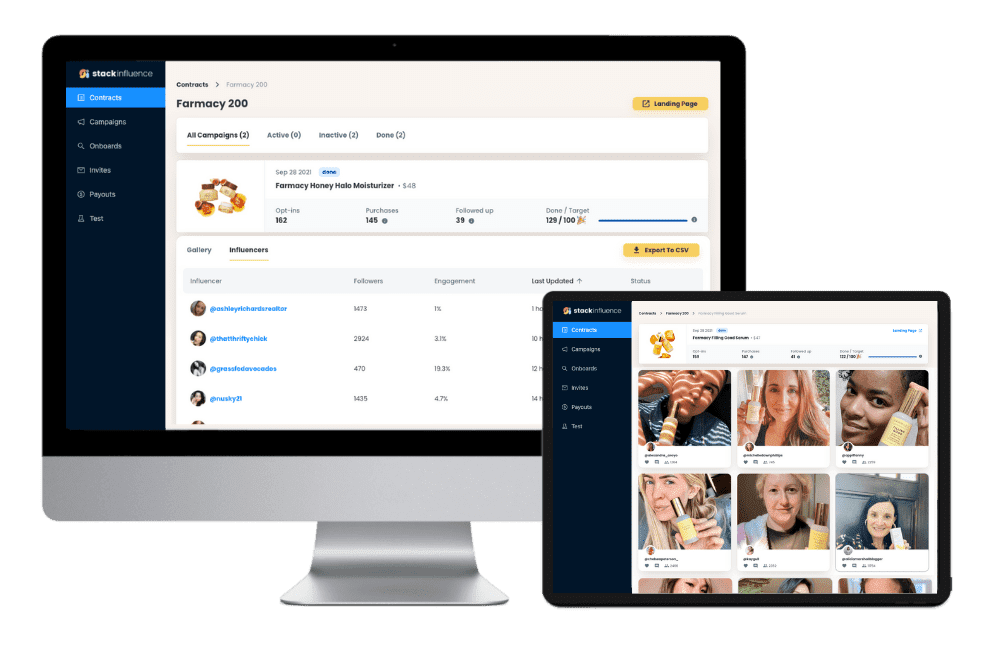
Unlock the Power of Micro Influencers and Elevate your Brand Today!
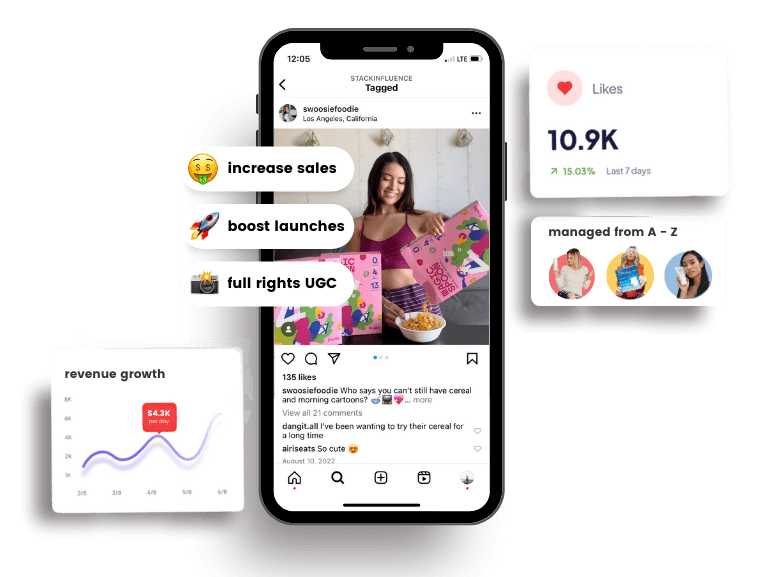
Top SEO Tools for Social Media in 2025
To effectively integrate SEO into your social media strategy, you’ll want to use a mix of tools. Below is a list of top SEO tools for social media (both free and paid) and how they can help you optimize social content, discover trends, and analyze performance. These tools are invaluable whether you’re an influencer marketer, content creator, or managing social media for an e-commerce brand.
1. Stack Influence

When it comes to blending SEO and influencer marketing, Stack Influence stands out as a platform that helps brands generate search-boosting user-generated content (UGC) at scale. By connecting e-commerce brands and Amazon sellers with thousands of vetted micro influencers, Stack Influence automates product seeding campaigns that result in authentic reviews, photos, and social posts. These influencer-generated assets not only build trust across TikTok, Instagram, and YouTube but also enhance search visibility on both social and traditional search engines. The backlinks, mentions, and engagement signals created through these campaigns strengthen overall SEO performance while driving conversions. In short, Stack Influence turns everyday social content into a powerful SEO engine—helping brands rank higher, sell more, and grow faster across every platform.
2. Google Trends

Google Trends is a free tool that shows what topics are trending in search in real time. It’s fantastic for social media because it helps you identify the hot topics and keywords your audience is interested in at the moment. You can browse the “Trending Now” section to spot viral subjects and seasonal trends, then create timely social media posts around those ideas. For instance, if a particular hashtag or search term is spiking in Google Trends, you might incorporate it into your TikTok or Instagram content to catch that wave of interest. Using Google Trends for social media content ensures you’re tapping into current conversations and posting content that people are actively searching for. It’s especially useful for micro influencers and content creators who rely on agility and relevance to grow their following. (Bonus: Google Trends isn’t limited to web search – you can filter by YouTube search, or even regions, to tailor insights to each platform.)
3. Semrush
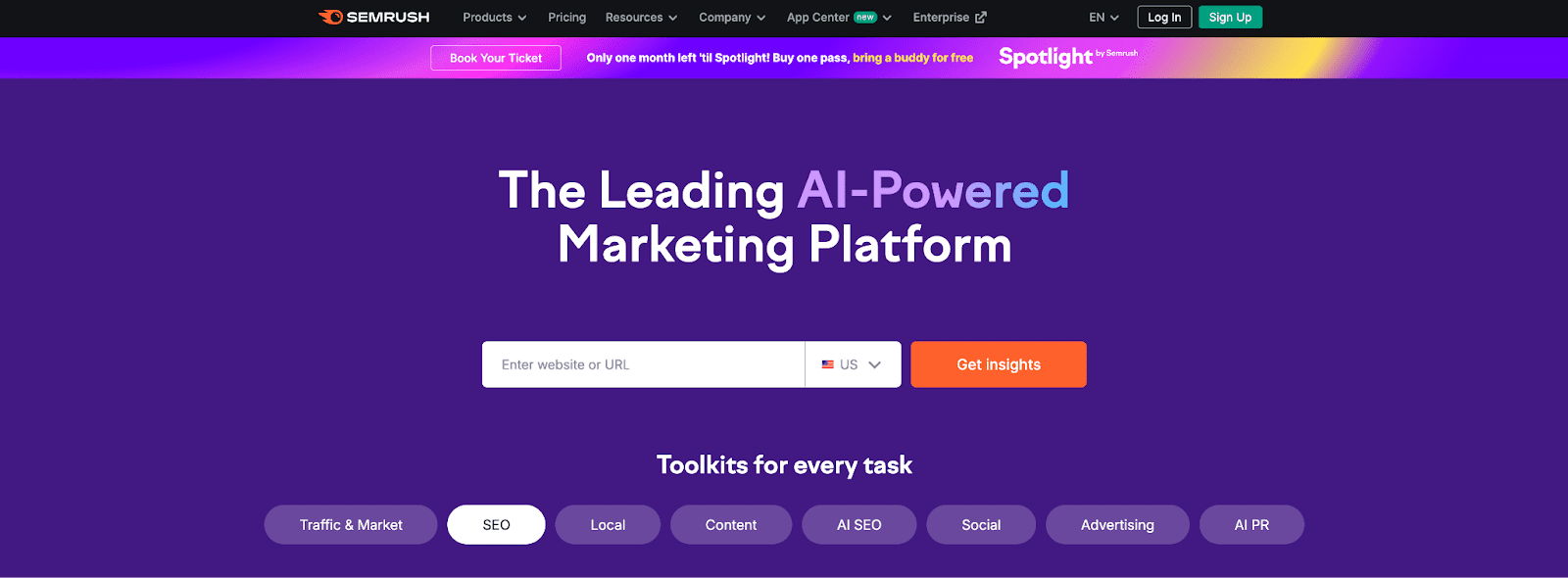
Semrush is one of the most versatile SEO platforms on the market, known for its robust keyword research, competitor analysis, and site auditing features. It’s no surprise Semrush tops many “best SEO tools” lists, as it offers everything from in-depth competitive SEO analysis and rank tracking to content optimization in one place. For social media marketers, Semrush’s value lies in its integrated approach – it includes a Social Media Toolkit that lets you plan and schedule posts, track engagement, and monitor competitors’ social performance alongside your SEO data. This means you can research high-volume keywords, optimize your blog or product page for SEO, and then use those same keywords in your social posts and hashtags – all within one platform. Semrush even allows you to generate SEO-friendly social content ideas and analyze how your social campaigns drive traffic to your site. For example, an Amazon seller could use Semrush to find keywords that are popular on Google and see how competitors are performing on social, then craft posts to drive external traffic to their Amazon listings. With its comprehensive feature set, Semrush is a go-to tool bridging traditional SEO and social media marketing.
4. Ahrefs
Ahrefs is another leading SEO suite favored by marketers for its powerful backlink analysis and content research tools. While primarily known for web SEO, Ahrefs offers features that social media marketers can leverage, especially for content planning. Ahrefs’ Content Explorer lets you search a topic or keyword and see the most shared and linked-to content around that topic – this helps identify what resonates on social platforms. Additionally, Ahrefs provides keyword research not just for Google, but for YouTube and even Amazon. This is a boon for content creators and e-commerce sellers looking to optimize video descriptions, YouTube titles, or Amazon product keywords based on what people are searching. With Ahrefs, you can also track brand mentions across the web and social (through its alerts), keeping you informed of UGC or influencer content that could be boosting your brand’s profile. In short, Ahrefs helps you discover high-performing content ideas and popular keywords to inform both your SEO strategy and your social media content, ensuring consistency across channels. It’s a great tool for content creators who want data-driven insight into what topics will get traction across blogs and social posts.
5. BuzzSumo
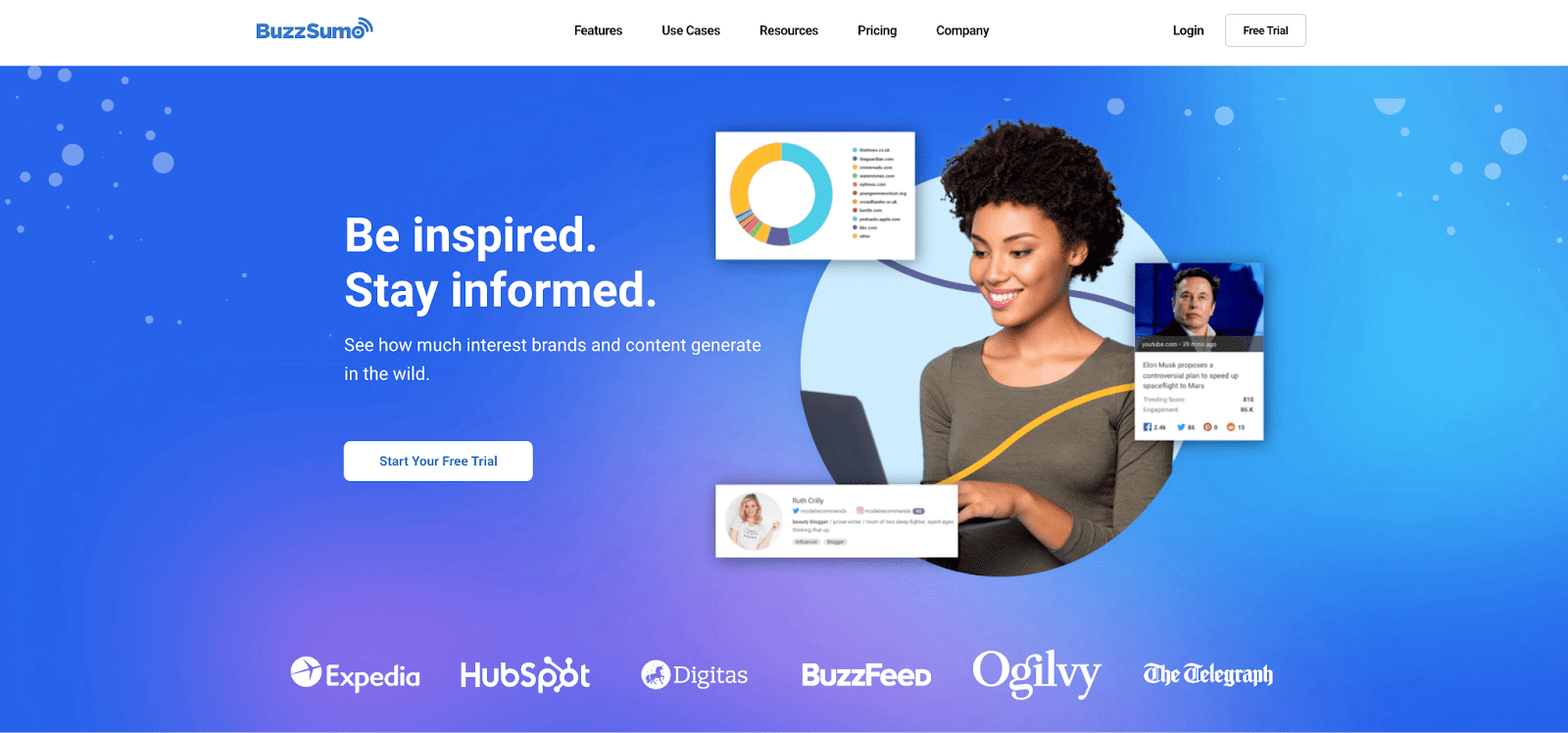
BuzzSumo is a specialized tool built for content marketing that shines at analyzing what content works well on social media. Put simply, BuzzSumo “tracks both web content and shares across major social media sites” to identify the most popular posts, topics, and even the key influencers for any niche. For example, you can enter a keyword (say “UGC marketing” or “vegan skincare”) and BuzzSumo will show you the top-performing articles or videos on that topic, along with how many times each was shared on Facebook, Twitter, Pinterest, etc. It’s a foolproof way to gauge what your audience finds engaging. BuzzSumo also helps with influencer marketing: it can reveal which influencers shared a particular high-performing post, so you can identify and reach out to those creators. This makes it invaluable for micro influencer campaigns – brands can discover niche influencers who are already talking about topics relevant to their product or industry. Additionally, BuzzSumo’s backlink and sharer info can guide your SEO link-building strategy by showing who’s amplifying content in your space. For social media managers and content creators, BuzzSumo takes the guesswork out of content planning by backing it with real engagement data. It ensures your next blog post, tweet thread, or Instagram carousel covers a topic that’s proven to resonate with the community.
6. Surfer SEO
Surfer SEO is an AI-driven content optimization tool that helps you fine-tune your writing for better search visibility. While Surfer is typically used for optimizing blog posts or website content, it’s equally effective for Google and for AI-powered search platforms, which increasingly includes social platforms with AI discovery features. Surfer provides a content score and suggestions for keywords, headings, and length based on analyzing top-performing content for a given query. How does this help on social media? If you’re a content creator writing a long LinkedIn article, a detailed Pinterest description, or even a script for a YouTube video, Surfer can guide you to include the terms and topics that will make that content more discoverable. It ensures you’re covering the right subtopics and using an appropriate density of keywords that algorithms (and audiences) expect to see. Surfer SEO is especially popular among bloggers, freelance writers, and e-commerce entrepreneurs who maintain content-heavy sites and want to repurpose that content on social channels. By using Surfer’s recommendations, you can create user-first, optimized content that ranks organically, whether that’s on Google or within the search function of a social platform. In the context of social media SEO, Surfer can be the secret sauce that helps a long-form Facebook post or a YouTube video description perform better and reach more people via search.
7. Hootsuite (Social SEO Tool & Analytics)
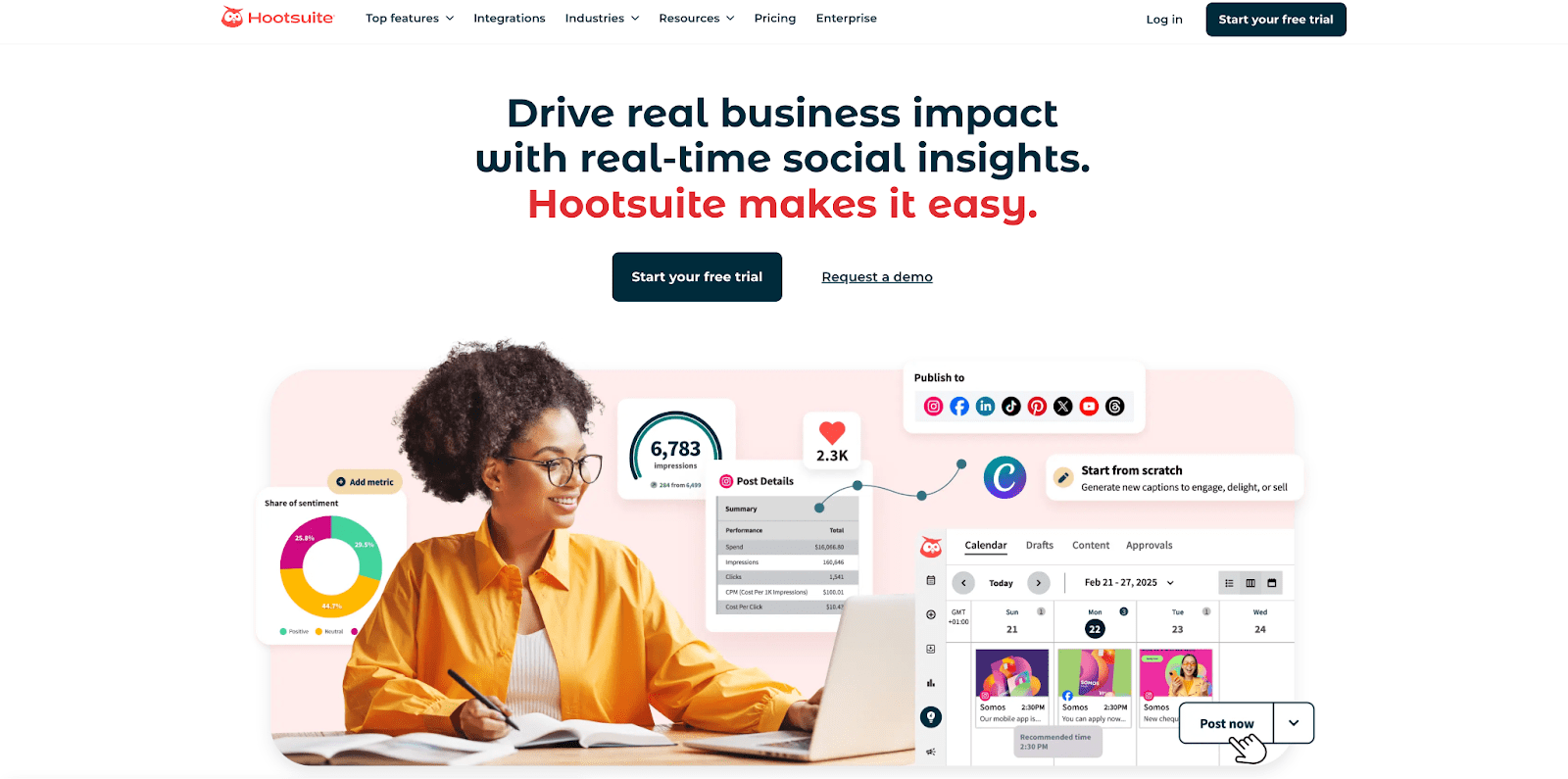
Hootsuite is a well-known social media management platform, and it has recently embraced the importance of social media SEO. In addition to allowing you to schedule and monitor posts across all major networks, Hootsuite introduced a free Social SEO tool that generates captions optimized for search visibility on social platforms. This means Hootsuite can actually help you craft your Instagram or TikTok captions so that they contain relevant keywords and are more likely to appear in in-app search results. It’s a recognition that things like Instagram captions and TikTok descriptions now function like mini SEO fields. By using Hootsuite’s tool, you save time and get social posts that are pre-optimized for the platform’s search algorithm. Beyond this, Hootsuite’s analytics can show you how your posts are performing, which helps you refine your strategy (e.g., seeing which posts drove profile visits or clicks – akin to how we’d use Google Analytics for websites). Consistently using a tool like Hootsuite ensures you’re posting at the right times and maintaining active engagement – which indirectly benefits SEO by increasing brand awareness and the likelihood that people search for your brand or content. In summary, Hootsuite is key for executing a search-informed social strategy: you plan, optimize, and analyze all in one place.
8. Google Analytics (GA4) – Social Traffic & Conversion Tracker
Google Analytics might not be the first thing you think of for social media, but it’s crucial for measuring how social media efforts contribute to your SEO and business goals. GA’s latest version (GA4) allows you to track traffic sources in detail, including separating out traffic from each social network. It treats social media as a distinct channel and can answer important questions like: Which social platform drives the most traffic to my site? Do visitors from Instagram engage with my site longer than those from Facebook?. By analyzing this data, you can gauge the ROI of your social media campaigns and see how social traffic compares to organic search traffic. For example, if your influencer marketing campaign on YouTube led to a spike in website visits or product sales, GA4 will capture that. It also helps identify if social visitors convert (e.g., sign up or purchase) at a different rate than others. All this informs your strategy: you might discover that Pinterest drives tons of referral traffic to your e-commerce store, so you double down on optimizing your Pinterest SEO (boards, pins, keywords), or that Twitter traffic has high bounce rates, so maybe not as valuable. In essence, Google Analytics closes the loop, connecting your social media SEO efforts to tangible outcomes. It’s a must-have tool to monitor and refine your strategy over time, ensuring that your SEO tools for social media are actually delivering results.
9. CoSchedule (Headline & Content Scheduler)
CoSchedule offers a suite of marketing tools, but it’s particularly handy for social media SEO in two ways: its headline analyzer and its content calendar. A compelling headline or social post title can make the difference in engagement and search performance. CoSchedule’s Headline Analyzer scores your titles (for blog posts, YouTube video titles, social captions, etc.) and gives suggestions to make them more SEO-friendly and click-worthy. Meanwhile, CoSchedule’s marketing calendar helps you plan when and where to post content. This matters for SEO because consistency and timing on social media can improve engagement, which signals algorithms to surface your content more. CoSchedule has been noted as an affordable tool that enhances social media platform SEO by helping you plan and optimize posts (and even find the best times to post). In a list of affordable SEO tools for social media, CoSchedule is mentioned alongside Google Trends and Hootsuite. For a content creator or small business, CoSchedule can keep your social and content strategy organized, ensure you’re using strong keywords in your titles, and automate your posting schedule – all of which lead to better visibility and reach.
Comparison of Key Tools and Their Uses:
|
Tool |
Primary Use |
SEO-Social Media Benefit |
|
Stack Influence |
SEO and influencer marketing |
Turns everyday social content into a powerful SEO engine |
|
Google Trends |
Trend & keyword discovery |
Find trending topics/keywords to inform timely social content. |
|
Semrush |
SEO suite + Social management |
Research keywords & schedule social posts in one platform. |
|
Ahrefs |
SEO suite (content/backlinks) |
Uncover high-performing content ideas; keywords for YouTube/Amazon. |
|
BuzzSumo |
Social content analytics |
Identify most shared content and key influencers in your niche. |
|
Surfer SEO |
Content optimization (AI) |
Optimize long-form social content (e.g. YouTube descriptions) for search. |
|
Hootsuite |
Social scheduling & analytics |
Plan posts and use social SEO caption tool for better visibility. |
|
Google Analytics (GA4) |
Web analytics |
Track traffic/conversions from social, proving ROI of social SEO. |
|
CoSchedule |
Headline analyzer & calendar |
Optimize post headlines for SEO; schedule consistent posting. |
|
BuzzSumo |
Content research & influencers |
Find viral topics and who’s sharing them to guide content strategy. |
(Table: A quick overview of top SEO tools for social media, showing each tool’s main use and how it connects SEO with social media.)
Using SEO Tools to Boost Your Social Strategy: Best Practices
Having the right tools is half the battle – the other half is using them effectively as part of your workflow. Here are some best practices to get the most out of these SEO tools for social media:
-
- Do Keyword Research for Social Content: Treat your social media captions, descriptions, and hashtags like you would a webpage’s SEO title or meta description. Use tools like Google Trends and Semrush to find keywords or hashtags that your target audience is searching for, and incorporate them naturally into your posts. For example, a travel micro influencer on Instagram might use Google Trends to discover that “eco-friendly travel tips” is rising in search popularity, then ensure to use that phrase in a Reel caption or as a hashtag. Remember that social media platforms themselves have search bars – optimizing for those can mean the difference between your content being found or not. TikTok’s search, for instance, rewards videos that include the query’s keywords in the description or even spoken in the video. So if you’re making a TikTok about “DIY bookcase,” say those words in the video and put them in text on-screen and in the caption for maximum searchability.
- Optimize Your Profiles: Your social media profile pages are like mini homepages for SEO purposes. Make sure to fill out bios, about sections, and descriptions using relevant keywords for your industry. For example, if you’re an e-commerce entrepreneur selling handmade jewelry, your Instagram bio and Pinterest profile should include keywords like “handmade jewelry,” “artisan accessories,” or similar terms someone might search. This improves your chances of appearing in in-app searches. Also, keep profile names consistent across platforms for brand recognition. Many tools (even free checklists from Hootsuite) can guide you through on-page optimizations for profiles – from using a custom URL on Facebook to adding category tags on LinkedIn.
- Leverage Influencer Marketing and UGC for SEO: One often overlooked “tool” in your arsenal is your network of influencers and fans. Collaboration can significantly amplify SEO impact. When brands partner with influencers (especially micro influencers who have niche, engaged audiences), both the brand and influencer benefit from cross-posting content. This cross-promotion exposes each to a wider audience and builds credibility and trust signals – search algorithms notice when a credible figure in your niche engages with or mentions your brand. It can even lead to more backlinks (for instance, a blog post by an influencer reviewing your product). Make use of platforms like Stack Influence (a micro-influencer marketing platform) to automate and scale these collaborations. Stack Influence connects brands with everyday content creators to generate authentic product reviews and social posts, which has been shown to boost Amazon sellers’ product rankings through increased reviews and traffic. In short, influencer marketing meets SEO when those influencer-generated contents become assets that drive search visibility and customer trust.
- Monitor, Measure, and Iterate: Use Google Analytics and the analytics dashboards of tools like Hootsuite or Sprout Social to continuously monitor performance. Which social posts are driving the most website clicks? What content got the highest shares or saved? Analyze this data to refine your strategy. Perhaps you’ll find that content with listicles or “how to” (classic SEO-friendly formats) also perform well on social media in terms of saves and shares. Or you might discover, for example, that your YouTube videos optimized with Surfer SEO guidance are ranking not just on YouTube but also on Google search. Treat every piece of content as an experiment – review the analytics, learn from it, and apply those insights to future content. The SEO tools mentioned often have reporting features (Semrush’s position tracking, BuzzSumo’s content reports, etc.) that can help here. Over time, you’ll hone in on the mix of content and optimization that works best for your brand on each platform.
- Stay Current with Platform Changes: Lastly, the social media landscape and search algorithms are always evolving. Follow industry news (blogs like Search Engine Land, Social Media Examiner, or Hootsuite’s blog) for updates on features like Instagram Alt text, TikTok SEO changes, or new tools powered by AI. For instance, if Instagram introduces a new search feature that prioritizes certain keywords in Reels, be ready to adapt your strategy. Many of the tools listed (like Semrush, Hootsuite, etc.) update their offerings to align with new platform features – make sure to utilize new features like Hootsuite’s social SEO caption generator or any new analytics integrations. Adapting quickly will keep you ahead of the competition.
- Do Keyword Research for Social Content: Treat your social media captions, descriptions, and hashtags like you would a webpage’s SEO title or meta description. Use tools like Google Trends and Semrush to find keywords or hashtags that your target audience is searching for, and incorporate them naturally into your posts. For example, a travel micro influencer on Instagram might use Google Trends to discover that “eco-friendly travel tips” is rising in search popularity, then ensure to use that phrase in a Reel caption or as a hashtag. Remember that social media platforms themselves have search bars – optimizing for those can mean the difference between your content being found or not. TikTok’s search, for instance, rewards videos that include the query’s keywords in the description or even spoken in the video. So if you’re making a TikTok about “DIY bookcase,” say those words in the video and put them in text on-screen and in the caption for maximum searchability.

Unlock the Power of Micro Influencers and Elevate your Brand Today!

Conclusion to SEO Tools for Social Media
The convergence of search and social media means that every social media manager, influencer, and online business owner should think like an SEO strategist. By using the right SEO tools for social media – from trend finders and keyword research tools to content optimizers and analytics platforms – you can create content that not only engages your followers but also attracts new audiences through search discoverability.
In this age of micro influencers and ubiquitous UGC, visibility is currency. An Amazon seller’s product can go viral on TikTok and climb the search rankings on Amazon and Google simultaneously. A content creator’s YouTube tutorial can dominate Google search results if properly optimized. By applying SEO principles (like keyword optimization, consistent publishing, and data-driven topic selection) to your social strategy, you build a stronger online presence across all channels.
Remember, “SEO tools for social media” are not about gaming algorithms – they’re about understanding your audience and delivering the content they want, where they’re looking for it. So leverage these tools, keep your content casual yet informative, and stay authentic. As search engines and AI continue to blend with social platforms, a holistic approach will ensure you and your brand remain discoverable, relevant, and one step ahead of the competition. Here’s to higher rankings and a thriving social community – happy optimizing!

By William Gasner
CMO at Stack Influence
William Gasner is the CMO of Stack Influence, he's a 6X founder, a 7-Figure eCommerce seller, and has been featured in leading publications like Forbes, Business Insider, and Wired for his thoughts on the influencer marketing and eCommerce industries.
Want new articles before they get published? Subscribe to our Awesome Newsletter.
stack up your influence
turning creativity into currency
our headquarters
111 NE 1st St, Miami, FL 33132
our contact info
[email protected]
stack up your influence
turning creativity into currency
our headquarters
111 NE 1st St, 8th Floor
Miami, FL 33132


